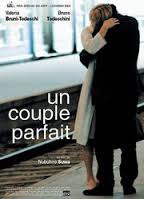
A PERFECT COUPLE
France/Japan, 2005, 104 minutes, Colour.
Valeria Bruni- Tedeschi, Bruno Todeschini.
Directed by Nobuhiro Suwa.
Towards the end of this very long cinema experience (so it seems), the husband says he is fed up. He has only had to live through this focus on a breaking French marriage. We have had to watch it and are far more entitled to be fed up.
This is the kind of film where knowing reviewers refer to the dialogue as Pinterish. But Pinter works so much better in the theatre than on screen. I began to wonder how many critics had coined the word 'interminababble'!
Since the film was so hard to watch (the lighting being very dark except for a scene in a cafe and two in the Rodin museum), I found I was distracting myself by planning a review. I wondered whether there was a difference between dialogue which was 'mundane' and that which was unineresting', 'inconsequential', 'banal'. (Then I was distracted by wanting a dose of mindless action.)
I have always liked Valeria Bruni- Tedeschi and remembered that she appeared to great advantage in 2004 in a much more interesting analysis of a marriage break-up, Francois Ozon's 5x2. Japanese director, Nobuhiro Suwa, expects his audience to be prepared to give him continued concentration on very long takes, on silences and on the dialogue which is mundane, uninteresting, inconsequential or banal according tolerance. The film certainly has its own style which will appeal to those who value 'festival audience' films and have a high capacity for endurance. It won the Jury prize at Locarno and acclaim for its being pure cinema and avoiding clichés.
1. The impact of the film? A festival film for festival audiences?
2. The style of the film, the Japanese director with a French setting? The long shots, the long sequences, the close-ups, the silences, the dialogue? The overall impact of watching the marriage break-up?
3. The title and its irony, their being held as an ideal, their breaking up? The reaction of their friends?
4. The arrival in the town, the past in Lisbon? The fifteen-year marriage? The break-up, the man not talking, the wife and her not liking her husband any more?
5. How well did the sequences illustrate the tension between the two: their silences, not talking and then talking, the wife laughing? In the car at the opening, the rooms in the hotel, the separate rooms? The long sequence of the dinner with friends? The party and the chit-chat? Going back to the hotel, the tensions? His going out and meeting the friend at the bar? Her going to the Rodin Museum? The seeming long time for them just to be with each other, the futility of their interactions?
6. The strength of the dialogue, mundane comments, banal comments? The audience watching, overhearing?
7. The sequence in the bar, the husband and the discussion with the old man, the story of his life, the discussion with his friend?
8. The wife, meeting Patrick in the gallery, the memories of the past, the child and the drawings, her not having a child?
9. The return, the different rooms, the lovemaking, her decision to go back alone, standing at the station, her not getting on the train?
10. How accurate a portrait of a brittle marriage, contemporary society, lack of communication?